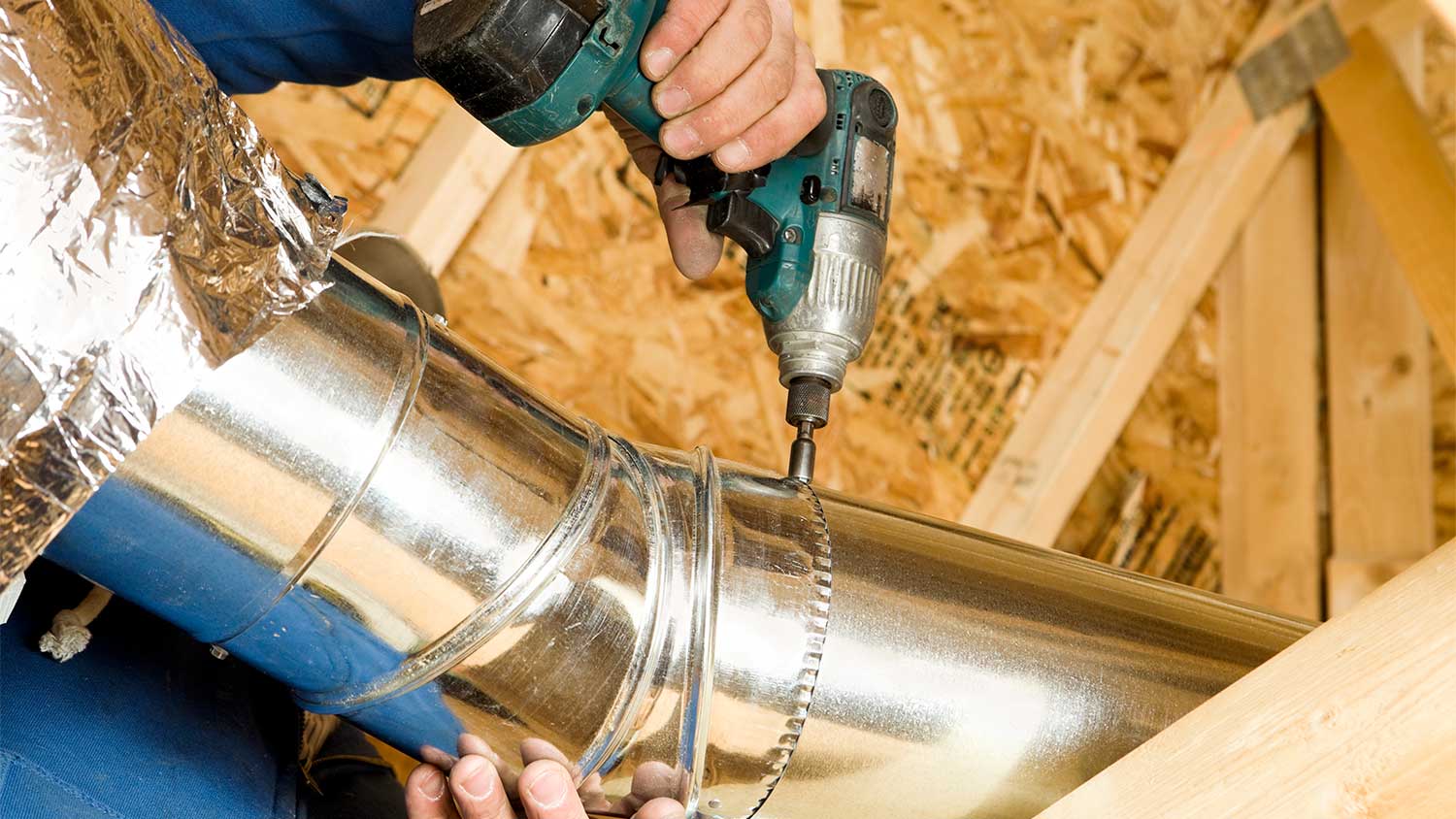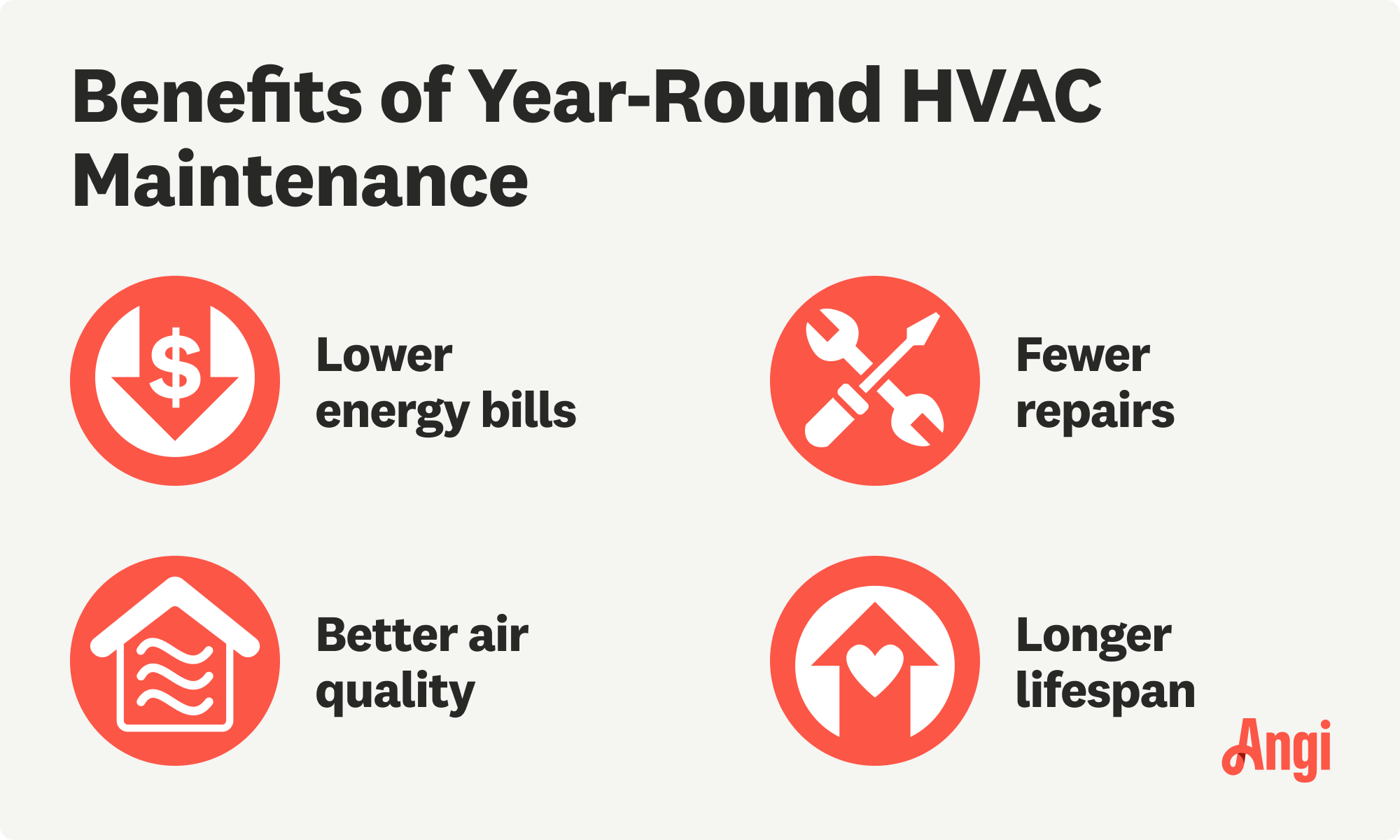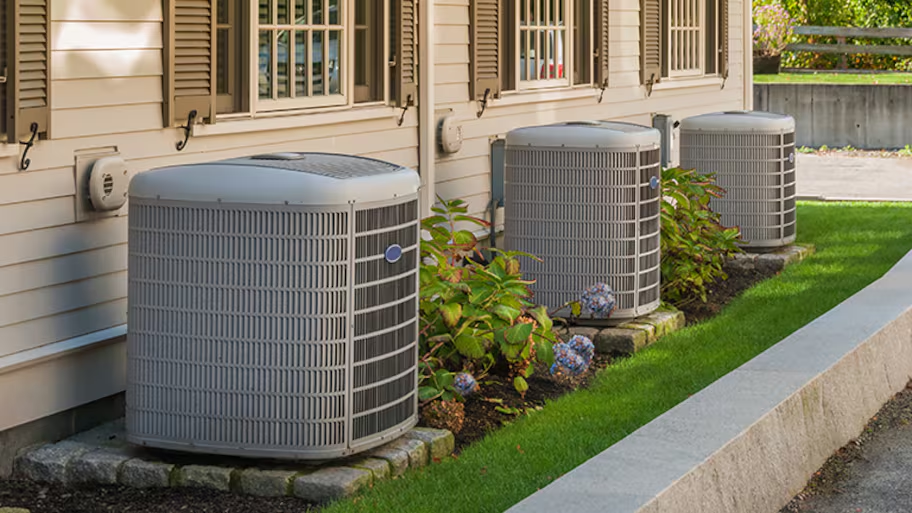
Springing for HVAC maintenance costs may seem like an extra—and easy-to-ignore—item on your checklist, but it will save you money in the long run.
HVAC repair costs range from $130 to $2,000 on average, but most people pay $350. The exact price depends on the type of repair you need and what kind of HVAC system you have, so call a pro for an accurate estimate.


The type of HVAC system affects cost the most, with central AC repairs totaling up to four times as much as mini-split repairs.
Compressor repairs are the most expensive type of HVAC repair due to high material costs and the lengthy replacement process.
Most HVAC systems last between 15 and 25 years, so consider replacing yours if it is approaching the end of its lifespan.
Avoid future repairs and breakdowns by scheduling routine maintenance with your HVAC professional.
HVAC repair costs $350 on average, though the price can range as low as $100 or as high as $3,000, depending on several factors. The type of HVAC unit that needs repair is the biggest factor in the overall cost, but other considerations like the type of repair necessary and labor fees all make up the final price. Consult a HVAC repair technician to get an accurate estimate.
Calculations are based on the cost of replacing an AC transformer. Calculations rounded to the nearest whole number.
| AC transformer part replacement | 1 AC transformer | $200–$600 |
| Initial HVAC service call cost | 1 HVAC service call | $100–$250 |
| HVAC labor | 2 hours | $200–$500 |
| Optional: HVAC inspection | 1 HVAC inspection | $80–$450 |
| Total | $500–$1,350 | |
| Total with options | $580–$1,800 |
Manny was very trustworthy and professional. He gave me a very fair price. Within 24 hours he had done his inspection and given me an estimate. It's the first time I talked to an HVAC company that didn't make me feel like I was getting overcharged. One of the other companies I spoke to was trying to charge 6 times the cost. He took lots of pictures and video and explained step by step what was done wrong by the other contractors and what he would need to do to fix it. He was able to do the work the day after I accepted the estimate. He completed all the work in one day. I am confident and very relieved to say that my HVAC system is set up properly.
There are a few things that impact the total cost of your HVAC system repairs. Certain parts are more expensive than others. It typically costs more to replace individual parts than it does to repair them—but not always. Sometimes the opposite is true. Here are the most important cost factors.
The standard HVAC system has two main components—an AC unit and a heater. The heater could be a furnace, boiler, or heat pump. Sometimes, it’s all wrapped into a single package unit (like you see with rooftop ACs or ductless mini-split systems). It just depends, but either way, the type of HVAC unit will impact the cost of repairs.
| Type of Unit | Common Repairs | Average Cost |
|---|---|---|
| AC repair | Drain line clog, compressor failure | $450–$2,000 |
| Furnace repair | Mineral buildup, clogged valves | $130–$1,200 |
| Heat pump repair | Dirty coil, broken fan motor | $200–$2,000 |
| Mini-split repair | Refrigerant leak, compressor issue | $300–$550 |
| Split system repair | Compressor malfunction, motor issues | $200–$300 |
| Packaged system repair | Electrical glitches, thermostat issues | $450–$550 |
Labor can account for as much as 50% of the project cost. Generally, an initial HVAC service call costs between $100 to $250—but that’s just for your contractor’s assessment. On the follow-up, the tech will either charge a flat fee for specific repairs (which includes the parts and labor) or $100 to $250 per hour on top of the cost of parts.
Different climates have different demands for HVAC systems. This influences the average cost of repairs because the most common repairs are different from place to place. You can also expect to pay more for labor in areas with a higher cost of living.
| State | Average Cost |
|---|---|
| California | $575 |
| Florida | $330 |
| Idaho | $375 |
| New Mexico | $480 |
| New York | $500 |
| North Dakota | $380 |
| Pennsylvania | $430 |
| Texas | $330 |
| Washington | $425 |
| Wisconsin | $360 |
When individual components break down, it can cost $100 to $2,000 to fix, depending on the severity of your issue. You could pay up to $7,500 for a full-on AC replacement. Take a look at what you’ll pay for various HVAC repairs.
| Repair | Average Cost |
|---|---|
| HVAC TXV | $100–$500 |
| AC tune-up | $70–$200 |
| Capacitor | $100–$250 |
| Circuit board | $100–$600 |
| Fan motor | $100–$700 |
| Heat exchanger | $100–$1,500 |
| Ignitor | $150–$300 |
| Thermostat | $150–$350 |
| Blower or fan motor | $200–$700 |
| Duct cleaning | $250–$1,000 |
| Duct repair | $500–$2,000 |
| Compressor | $800–$3,000 |
| Coil replacement | $600–$2,400 |
| Drain line cleaning | $75–$200 |
| Refrigerant leak | $250–$1,500 |
| Refrigerant recharge | $100–$500 |
| AC transformer cost | $200–$600 |

Beyond standard HVAC repairs, homeowners may have to spend on other related costs. This can include things like system replacement, ductwork repair, warranties, maintenance, and emergency repairs. Here are some things you might want to consider adding to your HVAC budget.
| Part | Average Cost to Repair | Average Cost to Replace |
|---|---|---|
| Air conditioning unit | $450–$1,000 | $3,800–$7,500 |
| Furnace | $130–$500 | $2,600–$6,200 |
Generally, an HVAC system replacement costs more than repairs, but replacements can be more cost-effective in the long run. You’ll typically want to replace a system if it’s nearing the end of its lifespan (around 10 to 20 years) because ongoing repairs will add up. You should also consider replacing your system if the required repairs amount to more than 50% of the cost of a new AC unit. To get the best value, always weigh the cost of replacing an HVAC system against the cost of expected repairs.
Do not ignore unusual odors, strange loud noises, or performance issues with your heating system. These can be indicative of serious problems. If you ever experience these, turn off your system and call a professional immediately.
Sometimes your HVAC issue isn’t because of your furnace or air conditioner. It’s actually an issue with your ductwork. In that case, expect to spend somewhere between $500 to $2,000 on ductwork repairs.
To properly maintain your HVAC unit, you should get an annual tune-up. This HVAC maintenance cost generally falls between $75 to $200, depending on what your contractor needs to do. You could spend as little as $10 to $50 replacing the air filter or as much as $750 to tune up a large AC in a spacious home.
Keep in mind that some manufacturers do require a service contract to maintain your system’s warranty. For most homeowners, HVAC service contracts cost between $150 and $500 per year.
Most HVAC systems come with a warranty. You can also purchase a home warranty. The typical home warranty system plan costs between $230 and $1,900 per year in addition to service call fees. This type of plan will generally cover your HVAC system, your plumbing, your home’s electricity, and your water heater.
Emergency repairs—which are made after typical business hours—generally cost more than scheduled repairs. The exact price depends on the problem, but an HVAC tech may charge an additional $40 to $80 per hour for this type of work.
Your annual tune-up typically includes a standard HVAC inspection. If something looks concerning, your contractor may request a ventilation inspection, which checks the electrical system and airflow. Expect to spend $80 to $450 on this type of inspection.
If you need to replace your HVAC system or install new ductwork, you might have to obtain an HVAC permit. This will add $250 to $400 to the cost of your project.
HVAC jobs are better off in the hands of a professional HVAC company near you, even if labor costs approach $100 to $250 per hour. The reason it still makes sense to hire a pro is because they bring the necessary expertise, specialized tools, and overall safety guarantees that a DIY job cannot.
HVAC pros know what they’re doing. Some of the benefits of hiring them are:
These pros are familiar with all aspects of the project. This includes safety considerations like air quality testing, electrical work, and other details.
Proper pros will have spent years as an apprentice, ensuring high-quality work.
These businesses are heavily regulated— you can expect them to have up-to-date licensing and powerful insurance.
HVAC pros aren’t afraid to work in uncomfortable spaces regardless of temperature.
Hiring a pro preserves your HVAC system’s warranty.
Long-term, you know the job has been done right. Since you breathe the air from your system every second you are home, this is an important factor.
We don’t recommend this. Homeowners should leave this work to the pros. However, you could:
Make sure your system is easy to access.
Give the pro plenty of space to work. They may need to check the air in each room.
Plan for the system to be down for a while. This might mean it’s time to break out some space heaters.

As a homeowner, saving a buck here or there is high on your list of priorities. Unfortunately, HVAC repairs can hinder those savings and have you wondering if your money is part of a disappearing act.
Yes, some HVAC repairs can be more expensive than others, but there are ways to save money on those costs, such as:
Buying an HVAC maintenance service contract.
Changing your filters regularly.
Keeping the area around your HVAC unit debris-free.
Replacing unrepairable parts when necessary.
Before you call a pro, try to find the manual for your HVAC system. Even just knowing the model number can help them a great deal. If you don’t know, snap a photo of any numbers you can find.
Depending on the problem, it may be focused more in some rooms than others. Pay attention to this, it can really help the pros.
Know that HVAC work is expensive. It’s a good idea for pricey projects to always get multiple quotes.
Let them know of any changes to your electricity bills. This can help diagnose the problem early, saving you money.
Home is the most important place on earth, which is why Angi has helped more than 150 million homeowners transform their houses into homes they adore. To help homeowners with their next project, Angi provides readers with the most accurate cost data and upholds strict editorial standards. We extensively research project costs to develop the pricing data you see, so you can make the best decisions for you and your home. We rely on reputable sources, including the U.S. Bureau of Labor Statistics, academic journals, market studies, and interviews with industry experts—all to ensure our prices reflect real-world projects.
Want to help us improve our cost data? Send us a recent project quote to [email protected]. Quotes and personal information will not be shared publicly.
From average costs to expert advice, get all the answers you need to get your job done.

Springing for HVAC maintenance costs may seem like an extra—and easy-to-ignore—item on your checklist, but it will save you money in the long run.

HVAC replacement costs depend on a lot of factors, like unit type, size, and labor. See what you can expect to pay for HVAC replacement here.

Find out the average humidifier repair cost, what impacts pricing, and how to save. Get expert tips to budget for your humidifier repair.

Wondering how to bleed a baseboard heater without a bleed valve? Here’s how to remove trapped air the old-fashioned way, with a boiler drain and water replacement.

Figuring out how to eliminate ductwork noise may require anything from replacing the ducts to changing the filter. Learn more about fixing this issue.
Furnace trouble can be frustrating, so learning the telltale signs of a failing furnace is important. Recognize the following red flags for a malfunctioning furnace.